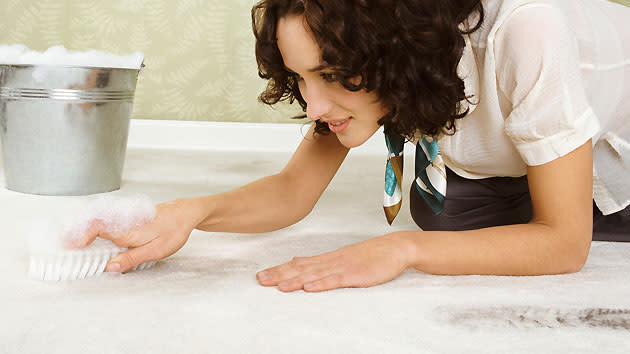 Shine On
Shine OnUnexpected items around the house that can pose real dangers to your cat

Dr. Avery Gillick, general manager of the Vancouver Emergency Clinic, has had his share of cat conundrums.
There was the time his nine-year-old feline, Pumpkin, hopped onto a coffee table, discovered a dish of coins and promptly swallowed one. Dr. Gillick endoscopically removed a nickelfrom the cat’s stomach. “Cats will pretty much eat anything,” he said. “That’s the first rule.”
Dr. Gillick, who has been a veterinarian since 1970, has treated cats that swallowed fishing line and lures, safety pins, threaded needles and tinfoil; he’s helped out cats that licked Desenex foot powder and diaper cream, just to name a few. “Because the tongue has barbs on it, objects can only go one way,” he said. “Cats have difficulty spitting things out.”
Yes, cats are curious and the household is a universe of delightful wonders to be explored. Here are some dangers and common sources of animal poisoning pet parents may have experience with…and others they may not have thought of.

Toys. Dr. Dalia Gough, a partner at the Grimsby Animal Hospital in Grimsby, Ont., treated a cat named Chocolate Chip that had been severely vomiting. An X-ray showed a dark orb in the cat’s tummy. An operation ensued. “It turned out to be a marble from the Hungry Hippos game,” Dr Gough said. “It was large enough that Chocolate Chip couldn’t pass it whereas a dog might have.”

Tinsel. Christmas may be the most wonderful time of the year but it’s also when all that glitters grabs your cat’s attention. Cats big and small chase after bits of sparkling material, grab and tear at the pieces and, sometimes worse. “They eat it and it ends up as a big bunch of material in the stomach. And then it gets into the intestinal tract and cuts it,” said Dr. Gillick, “And you have to go in and get it out.”

Laundry dryer. Cats love to be warm and snug: The front window where the sun comes streaming in might be a favourite spot to nap; perhaps your cat likes to lounge in your lap; sometimes, a basket full of hot clothes fresh from the laundry is irresistible; and even the dryer itself is appealing.
Dr. Gough points out that it’s easy to miss a napping cat in the dryer and then to toss a few more items and turn on the appliance. “I personally know three people who have lost cats this way. Don't take a chance: Always check the dryer before turning it on, and always keep the dryer door shut when you're not loading,” she said.
Food. Just because you’ve seen kittens and cats playing in a barn doesn’t mean they are fond of 2%. “Milk is not a normal part of their diet,” said Dr. Gillick. “They develop lactose intolerance just like people do. It can cause gastrointestinal upset.” Resist pouring saucers of cream. Chocolate, grapes, raisins (and, yes, chocolate-covered raisins) are also toxic to your purring pets.

String/Yarn/Elastic bands. When cats are left unsupervised with string or yarn, thread, hair elastics, or ribbon they sometimes eat the material, causing internal problems that may require surgery or even death. Dr. Gough said these items can twine around a cat’s tongue and get caught. The cat tries to swallow one end but the other is still caught in its mouth. “This can cause the intestines to accordion together and tear from the impact,” she said. During the busy holiday season, she recommends carefully discarding the strings from roasts to ensure your cat doesn’t try to ingest them; they’ll seem delicious since they are saturated with meat-juice.

Cleaning supplies. You’ve just washed your floor and are admiring the sparkle on the tile. And then your cat pads across the wet floor. Forget about being super annoyed at the itsy bitsy prints. Instead, grab a damp cloth and wipe your cat’s paws. It’s crucial to get that poisonous residue off before they start grooming, i.e. licking the chemicals.

Insecticides. Never use a flea-control product on a cat unless it specifically says on the label that it's safe for a cat. Products meant solely for use on dogs can kill cats. The best way to know is to check with your veterinarian.

Houseplants. Cats love to chew on houseplants so it’s essential to keep only those plants that won't poison your pet. The most important ones to be aware of are any plants in the lily family like poinsettias, onions and garlic, Dr. Gough said. Grab a cat-care book such as “Cats for Dummies” for a full list of dangerous plants.
Dr. Gough has a calico named Alice and a orange-and-white cat named Walter. “They are both very naughty about plants so I just don’t have plants around. If I do happen to get cut flowers for something special we have a spot above the fridge they can’t get to,” she said. “I used to have a spot above the water cooler because I thought they couldn’t land there but I lost a crystal vase because somebody was trying to land there and eat the plants…”

Medications. Dr. Gough advises against giving even the most seemingly mild medication to your cat – or any pet – without checking with your veterinarian first. “The biggest danger? Tylenol. It's fine for your headache, but likely lethal for your cat,” she said.
To protect your inquisitive pets: “Be aware, that’s all there is to it,” added Dr. Gillick.
For more information, visit Animal Poison Control, and in an emergency 1-888-426-4435.




